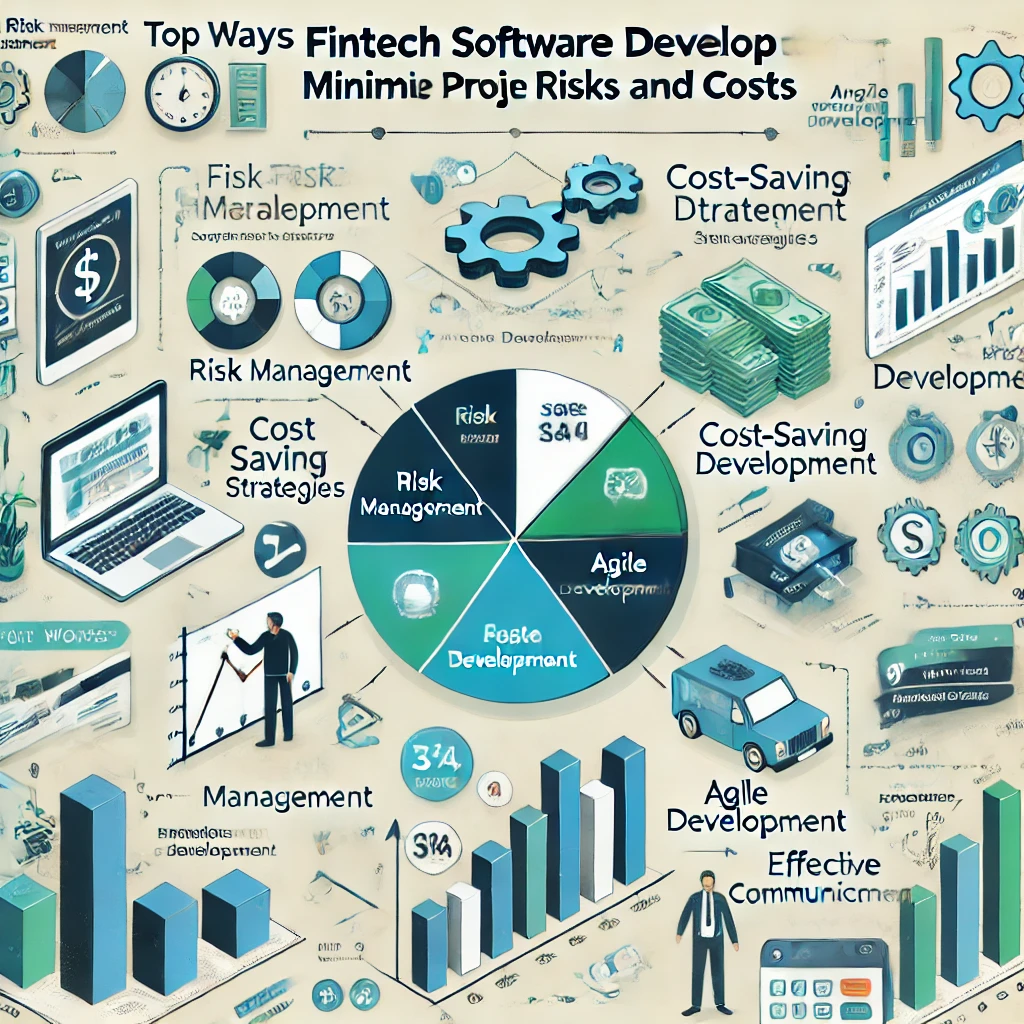FinTech Software Development: Transforming Financial Services with Custom Solutions

Strong 8k brings an ultra-HD IPTV experience to your living room and your pocket.
The finance industry is in the midst of a transformative era, with FinTech software development reshaping how institutions deliver services to customers. Traditional banking and financial services are being challenged by innovations like digital wallets, AI-driven insights, and decentralized finance. This evolution has led financial organizations to increasingly prioritize custom FinTech app development, offering advanced, secure, and personalized services. This article explores the significance of FinTech software, dives into its technical aspects, and discusses future trends that financial institutions cannot afford to overlook.
Introduction to Custom FinTech Software Development
FinTech’s Influence on Modern Financial Services
FinTech, short for Financial Technology, has brought agility, transparency, and efficiency to financial services. Digital solutions have grown rapidly, with FinTech’s global market size projected to reach approximately $305 billion by 2025. This surge is driven by demand for faster and more secure services, especially in sectors like mobile banking, peer-to-peer lending, and automated investment platforms.
Why Customization Matters in FinTech
Customization is crucial for aligning technology with specific business goals. Financial institutions can use custom FinTech software to implement personalized experiences, advanced data security, and specialized services. Custom applications are particularly beneficial for maintaining regulatory compliance, enhancing customer engagement, and adapting to evolving industry trends.
Key Benefits of Custom FinTech Software Development
Enhanced Customer Experience Through Personalization
Personalized experiences are at the core of effective customer engagement in FinTech. Custom solutions analyze individual user behavior to deliver tailored financial insights and recommendations. In a recent survey, 72% of consumers expressed frustration with generic financial offerings, reinforcing the importance of personalized features in custom-built FinTech apps.
Operational Efficiency and Cost Management
Process automation reduces operational costs significantly in the financial sector. A report from McKinsey shows that automation can lower operational expenses by up to 30%. By automating workflows, custom FinTech apps help institutions cut costs, reduce human error, and streamline customer services like loan processing and investment advisory.
Data Security and Regulatory Compliance
With the rise of cyber threats, data security is a top priority in FinTech. Custom applications allow institutions to tailor security measures, incorporating features such as two-factor authentication, data encryption, and role-based access controls. Compliance with regulatory requirements, like GDPR and AML, can also be customized into these applications, helping institutions avoid fines and protect consumer trust.
Future-Proofing Financial Solutions
The FinTech landscape is continually evolving, with trends like blockchain and artificial intelligence on the rise. Custom software allows for seamless updates, enabling institutions to integrate new technologies and scale their offerings as demand grows. Future-proofing reduces the need for costly upgrades and provides flexibility for growth and adaptation.
Types of Custom FinTech Applications
Mobile Banking Solutions
Mobile banking has revolutionized how customers interact with their banks, with 89% of U.S. adults now using mobile banking. Custom mobile banking apps enhance accessibility by offering features like real-time transactions, secure fund transfers, and personalized financial management tools. These features improve customer satisfaction and build loyalty.
Digital Wallets and Payment Gateways
Digital wallets and payment solutions have seen exponential growth, with digital transactions expected to surpass $8 trillion globally by 2025. Custom digital wallets enable secure transactions, support multi-currency transactions, and integrate with popular payment platforms, catering to a global audience. Payment gateways further enhance user convenience, allowing quick, secure payments for both online and offline transactions.
Investment and Robo-Advisory Platforms
Robo-advisors, with assets under management projected to reach $2.8 trillion by 2025, have become popular for automated, low-cost investment advice. Custom investment apps enable financial firms to offer personalized portfolio management and automated rebalancing. They can integrate algorithms that adapt investment strategies based on changing market conditions and client risk profiles.
Blockchain-Based FinTech Solutions
Blockchain technology provides unparalleled transparency, security, and efficiency in financial transactions. Applications include secure digital identities, cross-border payments, and decentralized finance (DeFi). Blockchain-based applications can reduce transaction costs by up to 40% and eliminate the need for intermediaries, providing a trustless financial environment ideal for high-stakes transactions.
RegTech and Compliance Management Apps
Regulatory Technology (RegTech) applications help institutions comply with complex regulations such as AML, KYC, and Basel III. These applications automate compliance processes, streamline reporting, and improve the accuracy of regulatory submissions. Custom RegTech solutions also allow for faster adjustments to changing regulations, reducing potential compliance risks.
Key Features of a Successful Custom FinTech App
Secure User Authentication and Data Encryption
Security is paramount in FinTech. Robust user authentication methods, including biometric verification and multi-factor authentication, protect sensitive financial data. End-to-end encryption ensures that data remains secure, whether in transit or at rest. Implementing these features mitigates the risk of data breaches, a key concern as cyberattacks cost the global economy over $1 trillion annually.
AI-Driven Analytics and Personalization
AI enables personalized insights and data-driven recommendations, enhancing the user experience. By processing vast amounts of customer data, AI-driven systems can predict behaviors, suggest products, and detect anomalies in transactions. For instance, predictive analytics in credit scoring reduces default rates by 15-20%, making loan approvals more efficient.
Real-Time Data Processing and Insights
Real-time analytics empower both institutions and users to make informed financial decisions. Processing data in real time helps institutions identify trends, monitor market changes, and detect fraudulent activities. Real-time insights are particularly valuable in areas like stock trading, where quick decisions can significantly impact investment outcomes.
Integration with Third-Party APIs and Services
Third-party API integration extends an application’s functionality. Custom FinTech apps often integrate with services like payment gateways, credit bureaus, and data analytics tools, providing users with a comprehensive, multi-functional platform. According to Finextra, 61% of banks expect APIs to improve their market reach, reflecting the growing value of API integration in custom FinTech development.
Cross-Platform Compatibility and User-Centric UI Design
User-centric design and cross-platform compatibility enhance accessibility and engagement. Cross-platform compatibility ensures consistent user experiences across devices, from smartphones to desktops. A user-friendly UI also simplifies complex financial processes, making applications more intuitive and easier for users to navigate.
Challenges and Considerations in Developing Custom FinTech Apps
Navigating Regulatory Compliance and Legal Standards
The financial sector is highly regulated, with each region imposing specific requirements. Custom FinTech software must comply with regulations such as GDPR in Europe, CCPA in California, and AML laws globally. Building compliant solutions is crucial to avoid hefty fines and maintain customer trust.
Data Security and Risk Management
As cyber threats evolve, financial institutions face increased risks. A study by IBM reported that the average cost of a data breach in the financial sector is $5.85 million. Risk management strategies, including regular security audits, anomaly detection, and fraud prevention, are essential components of custom FinTech applications.
Scalability and Future Compatibility
Custom solutions must be scalable to accommodate growth. Scalable FinTech applications can handle increasing transaction volumes and expand functionalities as business needs evolve. Cloud-based infrastructures are frequently utilized to ensure flexibility and reduce the risk of downtime, which can be detrimental in a financial environment.
Reliability and Uptime
For financial institutions, even minor downtime can lead to revenue loss and diminished trust. Custom applications use advanced infrastructure, often with cloud redundancy, to ensure high availability and reliability. According to a report by Statista, downtime costs businesses an average of $5,600 per minute, highlighting the importance of dependable FinTech solutions.
The Development Process of Custom FinTech Applications
Requirements Gathering and Market Analysis
The development process begins with gathering client requirements and conducting a market analysis to understand end-user needs. This ensures the application aligns with both business objectives and user expectations, setting a solid foundation for development.
User-Centric Design and UX Development
A user-centric design approach simplifies complex information, making it accessible and engaging. The design phase includes creating wireframes and user flows to ensure an intuitive experience. Research indicates that 94% of first impressions are design-related, emphasizing the impact of a well-designed interface.
Development Phases: Frontend, Backend, and API Integration
Frontend development focuses on creating an engaging interface, while backend development ensures secure data processing and storage. API integration connects third-party services, enhancing app functionality and providing users with a seamless experience across various services.
Testing for Security, Performance, and Compliance
Rigorous testing is conducted to ensure the app is secure, performs well, and complies with regulations. Security testing identifies vulnerabilities, performance testing assesses speed and efficiency, and compliance checks verify adherence to regulatory standards.
Deployment and Ongoing Support
Once the app is tested and approved, it is deployed to production environments. Ongoing support includes monitoring performance, fixing bugs, and updating features to adapt to new regulations or market demands.
Choosing the Right FinTech App Development Partner
Qualities to Look for in a FinTech Development Company
An ideal development partner should have deep experience in FinTech, a strong track record in security, and expertise in regulatory compliance. Look for companies with case studies in financial services and a clear understanding of user experience design.
Evaluating Technical Expertise and Portfolio
Review the development company’s portfolio to gauge their technical expertise. Strong coding practices, knowledge of emerging technologies (like blockchain and AI), and experience with financial software can indicate the capability to deliver a robust FinTech solution.
Understanding Project Management and Communication Styles
Effective project management and clear communication are crucial for successful collaboration. Ensure the development partner employs agile methodologies for flexibility and frequent updates, keeping stakeholders informed throughout the project.
Considering Cost and Value for Money
While cost is an essential factor, consider the overall value for money. Cheaper options may lead to compromises in security and quality. Aim for a balance between affordability and a robust, secure application that meets all requirements.
Future Trends in FinTech Software Development
The Rise of Decentralized Finance (DeFi)
Decentralized Finance (DeFi) is revolutionizing financial services by eliminating intermediaries, enabling peer-to-peer transactions, and improving financial access. DeFi applications are projected to reach $1 trillion in total value locked by 2025, creating opportunities for new business models and services.
Increased Use of Artificial Intelligence
AI is enhancing customer experience, risk assessment, and fraud detection in FinTech. Applications that leverage machine learning can analyze historical data to predict future trends, leading to improved decision-making and service delivery.
Integration of Blockchain Technology
Blockchain technology is gaining traction for its security and transparency benefits. Institutions are exploring private blockchain solutions for internal operations, while public blockchains facilitate secure transactions and smart contracts.
Focus on Sustainable and Ethical Finance
Sustainability is becoming a priority in financial services. Consumers are increasingly seeking eco-friendly investment options and socially responsible lending practices. Custom FinTech solutions can integrate these values into their offerings, appealing to a growing demographic of socially conscious consumers.
Conclusion
Custom FinTech software development is a crucial factor in shaping the future of financial services. By embracing innovation and tailoring solutions to meet user needs, financial institutions can enhance customer experiences, improve operational efficiency, and ensure regulatory compliance. As technology continues to evolve, staying ahead in the FinTech space will require adaptability, security, and a commitment to delivering exceptional value to customers. In this fast-paced landscape, investing in custom solutions is not just beneficial; it’s essential for success.
FAQs
1. What is FinTech software development?
FinTech software development involves creating applications and solutions specifically designed for the financial services industry. This includes mobile banking apps, digital wallets, payment gateways, robo-advisors, and more, aiming to enhance customer experience, improve operational efficiency, and ensure regulatory compliance.
2. Why should businesses opt for custom FinTech applications instead of off-the-shelf solutions?
Custom FinTech applications offer tailored features and functionalities that align with specific business needs, enabling personalized user experiences and unique service offerings. Unlike off-the-shelf solutions, custom apps allow for greater flexibility, scalability, and compliance with industry regulations.
3. How long does it typically take to develop a custom FinTech application?
The timeline for developing a custom FinTech application can vary widely based on complexity, features, and development methodology. On average, the process can take anywhere from a few months to over a year. Factors that influence development time include the scope of the project, design complexity, and regulatory considerations.
4. What are the key features to consider when developing a FinTech app?
When developing a FinTech app, essential features include secure user authentication, data encryption, real-time analytics, AI-driven personalization, cross-platform compatibility, and seamless integration with third-party APIs. Ensuring robust security measures and compliance with regulations is also crucial.
5. How can businesses ensure the security of their FinTech applications?
Businesses can enhance the security of their FinTech applications by implementing multi-factor authentication, end-to-end encryption, regular security audits, and employing advanced cybersecurity protocols. Partnering with experienced developers who prioritize security during the design and development phases is also essential.
6. What are the emerging trends in FinTech software development?
Emerging trends in FinTech software development include the integration of AI and machine learning for predictive analytics and personalized services, the rise of decentralized finance (DeFi) solutions leveraging blockchain technology, and the growing demand for real-time payments and instant fund transfers. Keeping up with these trends is crucial for staying competitive in the financial services industry.
Note: IndiBlogHub features both user-submitted and editorial content. We do not verify third-party contributions. Read our Disclaimer and Privacy Policyfor details.




